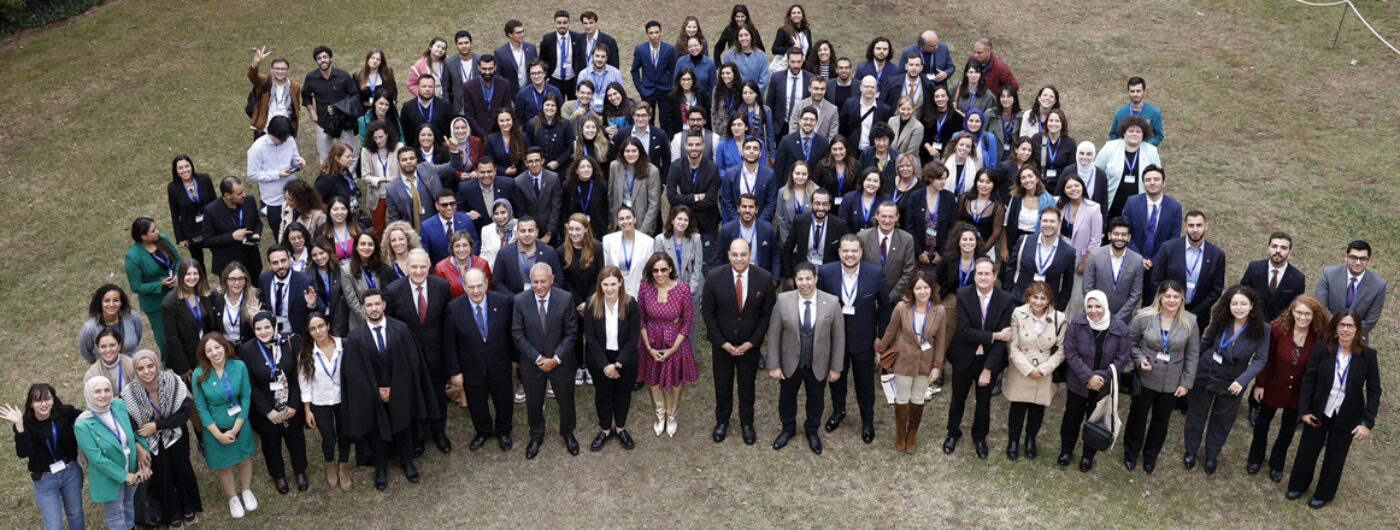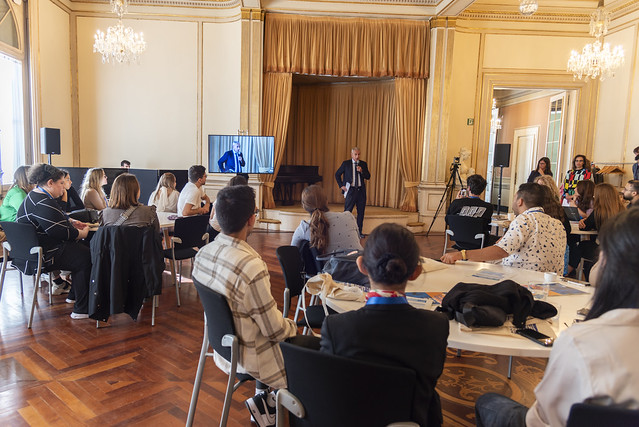
100 Euro-Mediterranean youths take part in UfM event tackling climate change, youth unemployment and social exclusion
- The Union for the Mediterranean (UfM), within the framework of the 3rd edition of the Mediterranean Youth Academy, hosted an Event on Youth Engagement for a Sustainable Mediterranean for leaders, international and civil society organisations, and youths, which took place in Barcelona between the 6 to 9 November 2023. A hundred young people from some 20 Euro-Mediterranean countries discussed how to increase youth involvement in the green and digital transitions, the workforce and decision-making bodies.
- Participants endorsed the 2030 UfM Youth Agenda: Call for Action, a set of 12 proposals and recommendations for public and private institutions aimed at strengthening the role of young people in the response to global challenges.
- In a region where up to 50% of the population is under the age of 24, young people constitute one of society’s most vulnerable groups. Although they face high levels of unemployment and low levels of political representation, they remain key actors in solving pressing global and Euro-Mediterranean challenges when engaged as active contributors to society. Youth empowerment is therefore one of the UfM’s main goals. It seeks to achieve it through various initiatives, including the Event on Youth Engagement for a Sustainable Mediterranean and the 2030 UfM Youth Agenda: Call for Action.
9 November 2023, Barcelona. The Union for the Mediterranean (UfM) hosted the Youth Engagement for a Sustainable Mediterranean, an event co-organised with Egypt’s Mediterranean Youth Foundation, in collaboration with the Anna Lindh Foundation, IEMED and Casa Mediterráneo and sponsored by GIZ. 100 young people from some 20 Euro-Mediterranean countries discussed how to promote youth involvement in three critical areas: the green and digital transitions, employment, and social inclusion. This forum for leaders, international and civil society organisations, and youths took place within the framework of the third edition of the Mediterranean Youth Academy, a four-day training programme from 6 to 9 November to involve young people in the response to these challenges.
Participants endorsed the UfM Youth Agenda: Call for Action, a set of proposals and recommendations for governments, international and regional organisations, and youth groups to reinforce the role of young people tackling major global challenges by 2030. Stemming from the quarterly working groups created following the adoption of the UfM Youth Strategy 2030 two years ago, the UfM Youth Agenda: Call for Action is structured around three (3) priority areas – Environment and Climate Action, Education and Employment, and Social Inclusion and Participation – and twelve (12) actionable steps. These include items such as establishing a grant scheme to address environmental challenges, supporting soft skill training programmes, or creating a regional youth policy dialogue framework. The document also serves as an advocacy paper to mobilise resources and generate greater political interest in youth-related activities. An overview of the Youth Agenda’s main points can be found here.
The event kicked off with opening remarks from UfM Secretary General, Nasser Kamel, the Jordanian Ministry of Youth, Fakhri Altwal, and Yasmeen El Sayed, the Vice-President of the Mediterranean Youth Foundation, all of whom stressed the importance of facilitating dialogue to empower young people and help them reach their full potential as drivers of positive change.
Ashraf Sobhy, Egypt’s Minister of Youth and Sports, and European Parliament President, Roberta Metsola, also highlighted the need to put young people at the heart of strategies to address climate change, unemployment, and social exclusion. Key insights from the Mediterranean Youth Academy were presented, after which Aya Serragui – a student at Sciences Po university in France – moderated a scene-setting talk on the state of the region’s main obstacles.
UfM specialists, public officials and civil society members took part in the three panels each dealing with issues affecting the region and their potential solutions: Empower Young People to Lead the Green Transition, Young Men and Women as Active Shapers of Euro-Mediterranean Society, and Bridging the Skill Gap towards Youth Employability and Entrepreneurship.
The UfM Secretary General, Nasser Kamel, used the occasion to draw attention to “the sorrowful situation our region is living. It is in moments like these that we must look to the future, to young people. They make up a sizable part of the population in the Euro-Mediterranean region, especially in the South and the East, but despite their boundless potential, they are all too often left behind. It is essential that this trend be reverted if we want to ensure a more sustainable and peaceful future for all. To this effect, the UfM Youth Agenda: Call for Action must act as a guiding document with concrete steps for youth empowerment while rallying political and financial support for this cause.”
Roberta Metsola, President of the European Parliament, noted: “We are facing challenges on multiple fronts, from climate change and digitalisation to geopolitical stability, employment and socioeconomic disparities. In the face of all these challenges, young people are our greatest asset. The decisions we take today will determine the fate of the Euro-Mediterranean region for generations to come. Youth engagement is not just a choice, but a necessity.”
The Minister of Youth and Sports of Egypt, Ashraf Sobhy, stated: “We firmly believe in the ability of our youth to shape the future. Through programmes, initiatives and partnerships, we strive to empower young people and provide them with the skills, opportunities and platforms they need to succeed and contribute to the development of our region.”
Mediterranean Youth Foundation Vice President Yasmeen El Sayed said: “Young people are an invaluable resource and they should be acknowledged as such. Key Euro-Mediterranean concerns include the right to movement and mobility, gender equality, and equitable access to resources and opportunities, although their severity differs between the North and South. We are, however, capable of overcoming the difficulties that stand in the way of our dreams and capabilities. We are a new Mediterranean generation, committed to promoting the values of dialogue, democracy, human rights, and women’s rights, creating opportunities for and by the youth.”
Background
Approximately a third of the population in Euro-Mediterranean countries is under the age of 24, a figure that rises to nearly a half in Southern and Eastern Mediterranean countries. Young people have the potential to find solutions to society’s pressing challenges when empowered to actively contribute as citizens, but their talent is not fully harnessed due to issues ranging from environmental crises to high unemployment, limited quality education, inadequate political representation, and gender inequality.
Empowering young people as catalysts for positive change remains a UfM priority that is advanced through various initiatives, including the adoption of the UfM Youth Strategy 2030 in 2021. As part of this strategy, the UfM supports impactful youth-led projects in the region, such as the Mediterranean Youth Academy and the Event on Youth Engagement for a Sustainable Mediterranean.
More information



